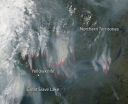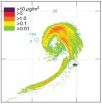(Press-News.org) There's some good news for parents of preterm babies – latest research from the University of Adelaide shows that by the time they become teenagers, the brains of many preterm children can perform almost as well as those born at term.
A study conducted by the University's Robinson Research Institute has found that as long as the preterm child experiences no brain injury in early life, their cognitive abilities as a teenager can potentially be as good as their term-born peers.
However, the results of the study, published in this month's issue of The Journal of Pediatrics, also highlight that the quality of the home environment at the time of the child's birth plays an important role in their cognition later in life.
"Every year, 10% of Australian babies are born preterm, and many studies have shown that these children often have cognitive difficulties in childhood," says one of the lead authors of the study, Dr Julia Pitcher from the University of Adelaide's Robinson Research Institute.
"This new study has some positive news. We looked at the factors that determine cognitive abilities in early adolescence, and found that whether or not you were born preterm appears to play a relatively minor role. Of significantly more importance is the degree of social disadvantage you experienced in your early life after birth, although genetics is important," Dr Pitcher says.
The study, conducted by Research Officer Dr Luke Schneider, assessed the cognitive abilities of 145 preterm and term-born young people now aged over 12. He also assessed data on social disadvantage at the time of birth and at the time of the cognitive assessment.
"The results of our study provide further proof that those born at term tend to have better cognitive abilities – such as working memory, brain processing efficiency and general intellectual ability. But the postnatal environment seems to be playing an important role in whether or not a preterm child is able to overcome that initial risk of reduced brain development," Dr Schneider says.
"Reduced connectivity in the brain, associated with microstructural abnormalities from preterm birth, is likely contributing to the cognitive deficits in these children. But these abnormalities seem to be amenable to improvement depending on the environment the child grows up in, particularly as an infant, and might account for why some preterm children do better than others."
Dr Pitcher says: "What we don't yet know is how different factors in the home environment drive specific aspects of brain development. But early nutrition and enrichment through physical and intellectual stimulation are likely to have key roles."
INFORMATION:
This research is supported by the National Health and Medical Research Council (NHMRC).
Media Contacts:
Dr Julia Pitcher
M.S. McLeod Research Fellow
Robinson Research Institute
School of Paediatrics and Reproductive Health
The University of Adelaide
Phone: +61 8 8313 1301
julia.pitcher@adelaide.edu.au
Dr Luke Schneider
Research Officer
Robinson Research Institute
The University of Adelaide
Phone: +61 8 8313 1307
luke.schneider@adelaide.edu.au
Preterm children's brains can catch up years later
2014-07-29
ELSE PRESS RELEASES FROM THIS DATE:
New anesthesia technique helps show cause of obstruction in sleep apnea
2014-07-29
July 29, 2014 – A simplified anesthesia procedure may enable more widespread use of preoperative testing to demonstrate the cause of airway obstruction in patients with severe sleep apnea, suggests a study in Anesthesia & Analgesia.
Dr. Joshua H. Atkins and Dr. Jeff E. Mandel of the University of Pennsylvania and their colleagues have developed a new "ramp control" anesthetic technique for putting patients to sleep briefly-just enough to show the "obstructive anatomy" responsible for sleep apnea. The simplified technique requires no special expertise and limits drops ...
Mysterious esophagus disease is autoimmune after all
2014-07-29
Achalasia is a rare disease – it affects 1 in 100,000 people – characterized by a loss of nerve cells in the esophageal wall. While its cause remains unknown, a new study by a team of researchers at KU Leuven in Belgium, the University of Bonn in Germany and other European institutions confirms for the first time that achalasia is autoimmune in origin. The study, published on 6 July in Nature Genetics, is an important step towards unraveling the mysterious disease.
When we swallow, a sphincter in the lower esophagus opens, allowing food to enter the stomach. Nerve cells ...
Worldwide water shortage by 2040
2014-07-29
Two new reports that focus on the global electricity water nexus have just been published. Three years of research show that by the year 2040 there will not be enough water in the world to quench the thirst of the world population and keep the current energy and power solutions going if we continue doing what we are doing today. It is a clash of competing necessities, between drinking water and energy demand. Behind the research is a group of researchers from Aarhus University in Denmark, Vermont Law School and CNA Corporation in the US.
In most countries, electricity ...
Mortality rates increase due to extreme heat and cold
2014-07-29
Epidemiological studies have repeatedly shown that death rates rise in association with extremely hot weather. The heat wave in Western Europe in the summer of 2003, for example, resulted in about 22,000 extra deaths. A team of researchers led by Dr. Alex-andra Schneider at the Institute of Epidemiology II at the Helmholtz Zentrum München examined the impact of extreme temperatures on the number of deaths caused by cardiovascular disease in three Bavarian cities and included both high and low temperatures in the study.
"Our findings confirm the results of our previous ...
A new brain-based marker of stress susceptibility
2014-07-29
DURHAM, N.C. -- Some people can handle stressful situations better than others, and it's not all in their genes: Even identical twins show differences in how they respond.
Researchers have identified a specific electrical pattern in the brains of genetically identical mice that predicts how well individual animals will fare in stressful situations.
The findings, published July 29 in Nature Communications, may eventually help researchers prevent potential consequences of chronic stress -- such as post-traumatic stress disorder, depression and other psychiatric disorders ...
First grade reading suffers in segregated schools
2014-07-29
A groundbreaking study from the Frank Porter Graham Child Development Institute (FPG) has found that African-American students in first grade experience smaller gains in reading when they attend segregated schools—but the students' backgrounds likely are not the cause of the differences.
According to the Center for Civil Rights, although the United States is becoming more racially and ethnically diverse, segregation is still on the rise. To better understand segregation's impact on student performance, FPG scientists looked at nearly 4000 first graders in public schools ...
Local education politics 'far from dead'
2014-07-29
EAST LANSING, Mich. --- Teach for America, known for recruiting teachers, is also setting its sights on capturing school board seats across the nation. Surprisingly, however, political candidates from the program aren't just pushing its national education agenda, they're advancing local issues as well, according to a new study.
The findings, said Michigan State University's Rebecca Jacobsen, refute the argument that school boards have become ineffective and obsolete in the wake of national education reform. Teach for America, a nonprofit that enlists high-achieving college ...
Wildfires continue near Yellowknife, Canada
2014-07-29
The wildfires that have been plaguing the Northern Territories in Canada and have sent smoke drifting down to the Great Lakes in the U.S. continue on. NASA's Aqua satellite collected this natural-color image with the Moderate Resolution Imaging Spectroradiometer, MODIS, instrument on July 26, 2014. Actively burning areas, detected by MODIS's thermal bands, are outlined in red. Copious amount of smoke are drifting northward in this image. Smoke is also creating havoc for residents of Yellowknife. Fire has caused power outages in the area and because of the smoke, line ...
Stem cell advance may increase efficiency of tissue regeneration
2014-07-29
A new stem-cell discovery might one day lead to a more streamlined process for obtaining stem cells, which in turn could be used in the development of replacement tissue for failing body parts, according to UC San Francisco scientists who reported the findings in the current edition of Cell.
The work builds on a strategy that involves reprogramming adult cells back to an embryonic state in which they again have the potential to become any type of cell.
The efficiency of this process may soon increase thanks to the scientists' identification of biochemical pathways ...
New research reveals Pele is powerful, even in the sky
2014-07-29
One might assume that a tropical storm moving through volcanic smog (vog) would sweep up the tainted air and march on, unchanged. However, a recent study from atmospheric scientists at the University of Hawai'i – Mānoa (UHM) revealed that, though microscopic, gasses and particles from Kilauea volcano exerted an influence on Tropical Storm Flossie – affecting the formation of thunderstorms and lightning in the sizeable storm.
In July 2013, as Flossie approached the Hawaiian Islands, satellites steadily monitored lightning, rainfall, cloud cover, temperature and ...


